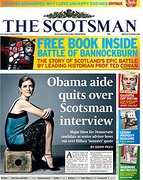 There was a fantastic clash on MSNBC last night between Tucker Carlson and Gerri Peev, the Scotsman journalist to whom Obama adviser Samantha Powers confided that she regards Hillary Clinton as a “monster”. It was an on-the-record interview but after Powers misspoke she instructed Peev “that’s off the record”. Peev had made no such agreement, and ran with the story. Why, Carlson asked, didn’t Peev do what she was told? She did a double-take. “Are you really that acquiescent in America?”. If the subject thinks “woops, that was controversial” and wants to strike a remark off the record that’s too bad unless this has been agreed beforehand. A riled Carlson thought he’d beat her up a bit and said “journalistic standards in Great Britain are so much dramatically lower than they are here” [in America] so “it’s a little much being lectured in journalistic ethics”. Doesn’t what Peev did make it more difficult for journalists to get to the truth? Peev replied: “If this is the first time that candid remarks have been published about what one campaign team thinks of the other candidate then I would argue that your journalists aren’t doing a very good job of getting to the truth.” Sadly, this extract ends before we can see the look on Tucker’s face. Fantastic.
There was a fantastic clash on MSNBC last night between Tucker Carlson and Gerri Peev, the Scotsman journalist to whom Obama adviser Samantha Powers confided that she regards Hillary Clinton as a “monster”. It was an on-the-record interview but after Powers misspoke she instructed Peev “that’s off the record”. Peev had made no such agreement, and ran with the story. Why, Carlson asked, didn’t Peev do what she was told? She did a double-take. “Are you really that acquiescent in America?”. If the subject thinks “woops, that was controversial” and wants to strike a remark off the record that’s too bad unless this has been agreed beforehand. A riled Carlson thought he’d beat her up a bit and said “journalistic standards in Great Britain are so much dramatically lower than they are here” [in America] so “it’s a little much being lectured in journalistic ethics”. Doesn’t what Peev did make it more difficult for journalists to get to the truth? Peev replied: “If this is the first time that candid remarks have been published about what one campaign team thinks of the other candidate then I would argue that your journalists aren’t doing a very good job of getting to the truth.” Sadly, this extract ends before we can see the look on Tucker’s face. Fantastic.
Now, I’m biased. I think the UK system works well. We honour off-the-record agreements – and, similarly, politicians don’t try to withdraw an indiscreete remark if the tape is whirring. But what do CoffeeHousers think? Should Peev have ran the quotes?
More on the Power resignation over at Americano







Comments